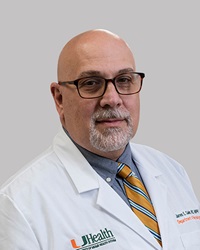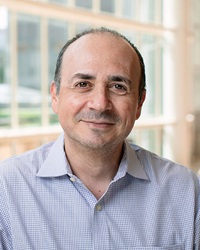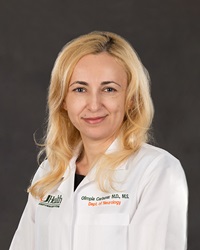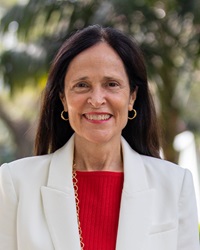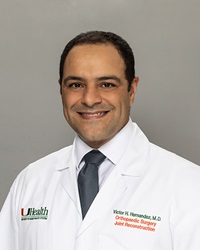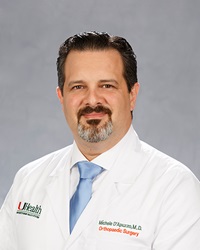Aging
-
Study Highlights Role of Immunometabolism in Aging
This study is the first to demonstrate that metabolic abnormalities in immune cells lead to a reduced ability to generate protective immunity. These findings provide a rationale for the development of new therapies that will spur helpful immune responses in the elderly and, thus, assist in warding off disease.
-
Deep Brain Stimulation for “Freezing of Gait” in Parkinson’s Disease
A interdisciplinary research team has developed an innovative protocol to target the gait-promoting center of the brain in patients experiencing 'freezing of gait,' a condition that impairs walking. Utilizing an advanced algorithm, they can precisely locate a small nucleus within the brainstem to enhance patients' mobility. The Miller School is among the few institutions in the U.S. employing deep brain stimulation to address this specific brainstem area. By leveraging fiber tracking technology, the team creates detailed images that reveal and target the intricate circuitry deep within the brain.
-
Improving Representation of Ethnic Minority Groups in Alzheimer's Research
Researchers are investigating a unique gene variant, predominantly found in the Puerto Rican population, which is linked to Alzheimer’s disease. Unlike other variants, which typically cause early-onset Alzheimer’s between ages 30 to 50, the G206A variant shows a wide range in age of onset, from 30 to 50 years. Understanding this variant may lead to insights on delaying Alzheimer’s onset in the broader population.
“We are one of the largest groups working on the genetics of Alzheimer’s disease, especially focusing on the inclusion of diverse groups.”
Scientists are also studying Alzheimer’s in Indigenous populations to understand whether health disparities and a higher burden of comorbid conditions may lead to earlier onset of disease in these groups.
This grant allows us to address Alzheimer’s disease in a very understudied group of individuals, while also increasing the diversity of scientists conducting research in Native populations.
Cancer
-
NCI Reaffirms Sylvester as South Florida’s Only NCI designated Cancer Center
The NCI recently renewed Sylvester Comprehensive Cancer Center’s designation—and it remains the only NCI-designated cancer center in South Florida. Sylvester was recognized for its impactful research, scientific accomplishments, survivorship and community outreach programs, as well as its commitment to training the next generation of physicians and researchers.
-
Scientists Unveil the First Individual Risk Prediction Model for Multiple Myeloma
-
Sylvester Brain Tumor Institute Launches to Personalize Brain Cancer Treatment
Sylvester Brain Tumor Institute will bring together experts in many fields of brain tumor patient care and research to collaborate on difficult-to-treat forms of cancer, with the goal of bringing more targeted, personalized care to patients.
-
Powerful AI Algorithm Provides New Insights Into Deadly Glioblastoma
An international research group, led by scientists at Sylvester, has developed a new machine learning algorithm that can combine large datasets from multiple sources to pinpoint cancer-driving enzymes called kinases and potentially target them for treatment. SPHINKS gives oncologists a new tool for treating glioblastoma patients.
Stroke/Hypertension
-
Mitigating the Global Burden of Stroke
Mechanical thrombectomy saves lives and prevents disability following large vessel occlusion stroke. But most patients don’t have access to the procedure.
Dileep Yavagal, M.D., professor and chief of interventional neurology and professor of neurosurgery, founded a global initiative that aims to increase access to stroke care throughout the world. The program recently expanded to more than 90 countries and published guidelines for building regional stroke thrombectomy systems.
-
Improving Stroke Care by Breaking Down Silos
The Florida Stroke Registry, managed and maintained by the Miller School, is a statewide initiative that merges data to provide a comprehensive picture of stroke care in the state.
The FSR recently received $1.5 million to enhance data infrastructure that will securely link acute stroke data with hospitals to create reports and provide feedback to stakeholders across the system of care.
Inflammation/Immunology
-
Evaluating Metabolic Deficits and Immune Dysfunction
A collaborative team at the Miller School was recently awarded more than $2.9 million to evaluate metabolic deficits and immune dysfunction in older people with HIV. People with HIV, even those on antiretroviral treatment, still have high levels of inflammation that is linked to aging and metabolic abnormalities, particularly in immune cells. Ongoing inflammation in virally suppressed people contributes to metabolic irregularities, which in turn affects overall immune function.
The study hopes to identify viable therapies to improve immune system function in this population.
-
Expanding the Patient Pool for Immunotherapies
Neurosciences
-
Revolutionary Therapies Offer Hope to Patients With Neuromuscular Diseases
-
Team Science Grant Advancing Cellular Therapies for Spinal Cord Injuries
Despite decades of research, no disease-modifying therapies for spinal cord injury exist, due, in part, to the cell heterogeneity at the injury site. Researchers are using large, single-cell datasets to identify compounds that can reverse cell-type specific disease signatures and employ advanced drug delivery systems to target spinal cord injuries.
-
New ALS Gene Discovery
Nutrition, Obesity, Diabetes
-
$50 Million to Accelerate Cure-Focused Research for Type 1 Diabetes
To accelerate research and find a permanent, biological cure for type 1 diabetes, the Diabetes Research Institute Foundation has committed $50 million to support the Diabetes Research Institute (DRI) at the Miller School. DRI, under the leadership of Matthias von Herrath, M.D., the institute’s scientific director, is working to develop a biologic cure by restoring natural insulin production and normalizing blood sugar levels without imposing other risks.
-
Islet Cell Transplantation a Reality for People with Type 1 Diabetes
Researchers have shown a monoclonal antibody suppresses immune rejection, a major challenge in harvesting and transplanting islet cells for type 1 diabetes. This antibody can also overcome blood clotting issues, potentially eliminating the need for lifelong immunosuppression after transplantation, said Norma Sue Kenyon, Ph.D., professor of surgery and chief innovation officer.
Virology/Emerging Infections
-
Multidisciplinary Team to Explore Links Between Oral and Mental Health in Women With HIV
-
R01 Grant Will Fund Nationwide Study of Opt-out Hiv and Hepatitis C Testing
Despite the widespread availability of HIV and hepatitis C testing at Syringe Service Programs, few people choose to get tested in these settings. A research team is helping organizations around the U.S. successfully implement and sustain opt-out initiatives and administer tests in a destigmatizing way.
-
The Possibility of a Cure
Research teams are working intensely on developing a vaccine for HIV, bringing renewed hope in the fight against the virus. Two cutting-edge approaches are under investigation: using AAV vectors to deliver broadly neutralizing antibodies and leveraging recombinant persistent herpes viruses as vaccine vectors. These innovative strategies are rooted in extensive experience with pioneering vaccine concepts in the SIV/macaque model.
Physical Fitness/Bone and Joint Health
-
The Impact of Patient Glucose Levels on Total Joint Replacement Surgery Outcomes
Researchers are enrolling total joint replacement patients for a groundbreaking study on glucose levels’ impact on surgical outcomes. This first large study of continuous glucose levels post-surgery will explore their effect on readmission rates, surgical site infections, and deeper prosthetic joint infections.
-
Exercise Changes Cancer Survivor’s Lives for the Better






